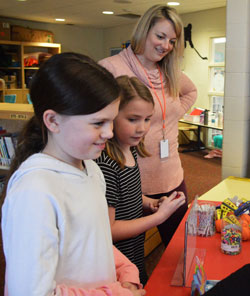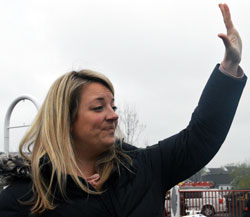Each morning, Molly Pippin meets with Countryside Elementary students to help them start their school day on a good note. She eats breakfast with them, goes over homework, checks on them in class, and talks to them about their lives. She lets them know she’s there for them.
Since being hired in January, the student support interventionist has become the consistent, dependable person students rely on.
“I’m always available. It’s very rare I can’t step away from something,” she said. “If there is a child who really needs someone one-on-one with them, I am that person.”
Profile of behavior interventionist Ben Hawkins: A positive presence in the halls

With the goal of providing an extra layer of support to meet the needs of students and staff in a proactive way, Byron Center Public Schools has added behavior interventionists to its three elementary schools, fifth-and-sixth grade building, middle school and high school. They join a team of six academic interventionists and full-time counselors in each building. The positions are mostly funded with grant money and dollars from the enhancement millage, approved in 2017, for all 20 districts served by Kent ISD.
“We were really looking to help serve the whole child,” said Assistant Superintendent Kevin Macina. “Many kids come to school with not only academic needs but social/emotional needs as well.The behavior interventionists is another way to support students who needed some extra support for everything outside of academics.”
The interventionists also provide needed support to counselors, social workers and classroom teachers. Pippin was hired to work directly with the 25 students who have had the most behavioral incidents at Countryside. That’s according to the school’s
Positive Behavioral Interventions & Supports system, an approach to addressing behavior through social, emotional and behavior support. She previously worked as a supervisor in child welfare for Arbor Circle and has a degree in social work.
Principal Jolynne Dobson describes Pippin as a “safe face” students are relieved to see every day, even if it’s just for a few minutes. “Sometimes that’s all it takes.”

A Proactive Approach
Discipline was taking up a lot of Dobson’s time, she said, and it was getting more and more difficult to address it in a preventive way. Enrollment at Countryside has grown from 400 to 550 students in the past dozen years. “I felt like we were becoming a school of consequences,” she said.
Having Pippin on board means she is now able to focus on her other responsibilities, she added: “It’s amazing what one position can do.”
Much of Pippin’s time is spent on the playground. When it comes to behavior, recess is the “hotspot,” Dobson said. Pippin helps students develop social skills and learn to get along with others. On a recent Friday, all was calm as students played “What Time is it Mr. Fox with Pippin.
At recess or inside, time with Pippin is always calming and supportive, even if a students is filling out a “Think Sheet” concerning a behavior incident. “I’ve made it very intentional that nothing negative comes from Molly,” said Dobson, who’s the one to dole out consequences.
“I feel like we’re making a difference for those kids,” Dobson continued. “Kids can’t learn if their emotional and social needs aren’t met.”
Pippin also frees up school counselor Carla Nienhuis to spend more time meeting with groups, working on classroom lessons that have a preventive angle, friendship groups, and self-regulation and grit. Said Nienhuis, “We are really addressing the whole child better.”










